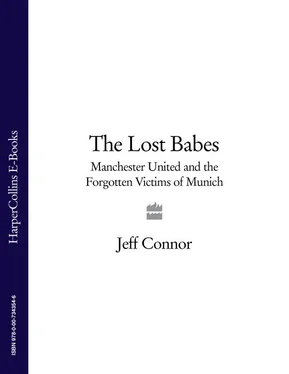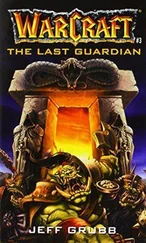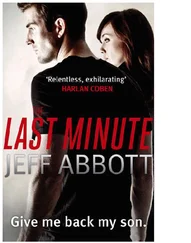Chilton, the sort of traditional, no-nonsense stopper endemic to every Busby team, and with his square shoulders and centre-parted hair the face of a thousand cigarette cards, did much of the motivational work in the dressing room. In Busby’s early days, and after a run of poor form and even poorer results, the manager had gathered his side for a midweek pep-talk. Busby had prepared his speech well, but as he began, Chilton turned to him abruptly and said: ‘Just sit down and keep quiet. I’ll do the talking. It’s our win bonuses on the line here.’ Busby did as he was ordered, Chilton spoke, the others listened and the rot was stopped.
Initially at least, the manager had his favourites. He played golf with Carey and Morris, another dangerously outspoken character and a man who at one time considered a career as a professional golfer after a falling out and a subsequent transfer listing by Busby. Busby also relished the skills of Mitten, one of the most gifted wingers of his, or any other, generation but also cursed with an impish and headstrong streak that was to lead to his downfall. Busby adored him, and so did the Old Trafford fans beguiled by his eccentricities and occasional foibles. As the side’s leading penalty-taker Mitten would often invite a goalkeeper to point in the direction he wanted him to strike the ball and he would then oblige by sending the ball that way with the goalkeeper powerless. But Mitten was unorthodox off the field too, and after the 1948 FA Cup win accepted a £10,000 signing-on fee and a wage of £60 a week to play alongside Alfredo di Stefano for Santa Fe in Colombia, a country outside the FIFA umbrella. The transaction was carried out in typical Charlie fashion as he not only failed to inform manager or team-mates but also his wife, Betty, who had booked a family holiday in Scarborough. Mitten went to South America, saw out his contract there and came home to find himself suspended. Busby, as he had promised when Mitten first set sail on his South American adventure, unloaded him, at a profit of £20,000, to Fulham.
Busby’s first great United side was to provide him with a blueprint for the next, a mixture of cost-nothing locals and former apprentices, alongside one or two shrewd buy-ins, notably the Scot Jimmy Delaney. Delaney, who had won a Scottish Cup medal with Celtic in 1937, was a fragile-looking wing originally reviled as ‘Old Brittle Bones’ because of his frequent injuries. It cost Busby £4,000 to persuade Celtic to part with the player in 1946, all but £500 of which he recouped four years later when Delaney went back over the border to Aberdeen: this was the sort of business in which the parsimonious Busby delighted. As for Delaney, he was to have the last laugh on those terrace critics who had questioned his longevity, winning a third winner’s medal—seventeen years after his first—with Derry City in the Irish FA Cup Final of 1954.
Delaney was Busby’s first outright cash signing and provided him with a tutorial in football management…that the occasional shrewd buy mixed with home-grown talent equated to fiscal commonsense.
There were other lessons to be discovered by the young manager, and not just about training regimes and tactics. With so many strong-willed characters, some not much younger than himself, Busby all too often found himself teetering on the line between friendship and the autocracy demanded of a successful administrator. It was a situation he determined never to put himself in again and before long, if players had a grievance they voiced it to Carey, or later Byrne, who would pass it on to the manager. Busby’s ability to distance himself from his players when it suited him was to become a hallmark of his long reign. He was also not afraid to unload any potential trouble makers in the ranks, the ‘barrack room lawyers’ as he called them. Faced with a players’ demand for improved bonuses following the 1948 FA Cup Final, Busby met the rebels at the neutral ground of the Kardomah Café just off Piccadilly in the centre of Manchester. After ten minutes of reasoning in that calm, mellifluous brogue, the rebels capitulated. Within twelve months Morris, one of the ringleaders, had been moved on. Many more players of independent mind were to follow him out of the Old Trafford door over the next two decades.
That 1947-48 season proved to be a landmark year for United. Not only did they have permission to begin the work that would eventually enable them to move back to Old Trafford, but the FA Cup win was to be the first major honour under the chairmanship of the indulgent Gibson and the ever-improving stewardship of Busby.
Runners-up in the league for the first two years after the war, the club had also made it to Wembley to face Blackpool in an FA Cup Final still recalled as one of the finest ever. The preparation, however, was far from ideal. Sandy Busby, Matt’s son, remembers his father setting off with the team on the Friday night: ‘There was no motorway and they arrived at Wembley in the early hours of the morning to play that afternoon. Dad came home on the Sunday in a very emotional mood.’
Despite the rigours of the journey United won 4-2, taking the trophy back to Manchester for the first time since 1909. Gibson, the chairman, suffered a stroke just before the final and could not travel down to London, but the team bus drove straight to Hale Barns on its return to Manchester, and the players presented the trophy to the man whose commitment to the club had kept the football team afloat and had sustained them for nearly two decades. The trophy, in the absence of a suitable glass-fronted cabinet at Old Trafford, was kept in a wardrobe in one of the chairman’s spare bedrooms.
On 24 August 1949, United returned home to Old Trafford, established themselves as title contenders for the next two seasons and, finally, in 1951-52, won the Division One championship for the first time in over forty years.
Unfortunately for the club’s head architect, James Gibson did not live long enough to add the league championship trophy to the household silverware, as he suffered another, fatal, stroke in September 1951.
As Busby had anticipated, the title-winning season of 1951-52 proved to be the swansong for many of the postwar side and it was plain to the manager that many had long ago stepped on to the downward slope feared by every athlete. When the following season started in alarming fashion with only one win in the first five games Busby acted with decisive ruthlessness.
Albert Scanlon, one of a new wave of young local players recruited by Busby in the early Fifties, says: ‘Matt saw the writing on the wall for a lot of the old guard and the kids started coming in. Initially there were no problems. Later there were.’
The emergence of the Busby Babes was not an accident. Busby had assembled a team of scouts, under the control of a sprightly, kindly, former Old Trafford goalkeeper called Joe Armstrong, to scour Britain for talent. Armstrong became a regular fixture at schoolboy and junior games in the north of England in the late Forties and early Fifties while a small team of alter egos—all seemingly similarly small, avuncular and with faces hidden under wide-brimmed hats—performed similar functions in other parts of the country. Most of that talent, as it happened, was waiting on their doorstep and even in the mid-Forties, up to forty, bright-eyed hopefuls from the streets of Salford and Manchester would assemble for weekly trials at Old Trafford. Like many others, Scanlon wonders to this day what became of the hundreds of Billys, Stans, Georges and Harrys who walked down Warwick Road, sandshoes, socks and shorts in carrier bags, to pursue a dream. Most were never seen again, although ‘at least they can tell their grandchildren: “I once had a trial for United”,’ says Scanlon.
Читать дальше












